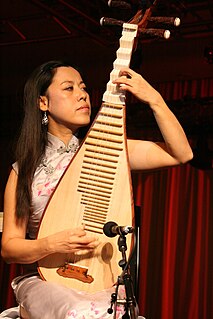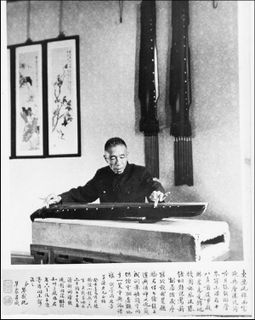Wu Zhaoji (吳兆基), also known as Xiangquan, was born in Hunan in 1908, China. At the age of 4, his family moved to Suzhou, where he lived the rest of his life until his death in 1997. Raised in a musical family, he learned the guqin from his father, and in 1921 became a student of Wu Jinyang. From a young age, he enjoyed sports and martial arts. In 1928 he began studying the Yang Style of Tai-chi with Chen Weiming. One year later, he became a student of Li Shangyuan, who is a student of Hao Weizeng a descendent of the Wu (Martial) Style Taichi family. After many years of study he created his own style of tai-chi based on Daoism.

Qinpu are tablature score collections for the Chinese musical instrument, the guqin.

Cheng Yu is a Chinese musician. She is internationally renowned as a performer of the pipa, a Chinese four-stringed lute, but also plays the guqin, a seven-stringed zither, and is a virtuoso, scholar and specialist of Chinese music.

Bo Ya (伯牙) was a qin player from the Spring and Autumn period or the Warring States period. He was known by his first name of "Boya", although his surname may have been Yu (俞), thus his complete name is sometimes given as Yu Boya (俞伯牙). The Lute Platform in Hanyang, Wuhan, China was where musician Yu Boya is said to have played. He is associated with the guqin pieces Gao Shan 《高山》 and Liu Shui 《流水》.
Guo Chuwang was a patriot at the end of the Song Dynasty and a musician of the guqin who composer of the piece Xiaoxiang Shuiyun 《瀟湘水雲》.

Zha Fuxi, also known as Zha Yiping (查夷平) was a leading player and scholar of the guqin. Born in Jiangxi, he started learning guqin in his childhood. In 1936, he co-founded the Jinyu Qin Society (今虞琴社) which later became one of the major national musical organizations for the guqin.

Guan Pinghu, was a leading player of the guqin (古琴), a Chinese 7-string bridgeless zither. Born in Suzhou, Jiangsu, Guan came from an artistic family, and started to learn the guqin from his father, Guan Nianci. After the death of his father when he was thirteen, Guan continued with his father’s friend Ye Shimeng and Zhang Xiangtao. He also studied with the leading players of three different schools; Yang Zongji (1865–1933), the leading player in Beijing, the Daoist Qin Heming, and the Buddhist monk Wucheng.
The North American Guqin Association is a guqin society based in the State of California, in the United States, which serves guqin players on the West Coast of the United States. Of the three major qin societies of the West, this society is the world's largest English speaking online community for the guqin and has the most connections and scope of activities.
Lin Youren was a noted player of the Chinese musical instrument guqin. He was famous for his unaffected playing style. Lin also taught guqin at the Shanghai Conservatory of Music.
A qin school is a school of guqin players that play in a style that is different from other styles.
Wu Jinglüe (吳景略) is considered one of the most important guqin players of the 20th century and was also an active researcher and teacher. He was born in the town of Xitang, Changshu County, near Suzhou in Jiangsu, China, and died in Beijing.
The history of the Guqin, an ancient Chinese musical instrument, is a long one that spans 3,000 years. Although similar, it should not be confused with another Chinese zither instrument, the guzheng, which has bridges.
The New York Qin Society is a guqin society based in New York, New York in America, serving guqin players on the East Coast of the United States. Of the three major qin societies in the West, this society is the most formally structured with a formal agreement of rules and a more learned society approach to selecting members.

Zhang Ziqian, a famous seven-string zither qin player, was born in Yangzhou, Jiangsu Province, China, during the late Qing Dynasty. He began studying the guqin with a guqin master Suo Shaotao at the age of thirteen. In the 1930s, Zhang moved to Shanghai and worked as an accountant at a salt factory. In Shanghai, he met Zha Fuxi and Peng Zhiqing who were active qin players then. They frequently played the guqin together and Zhang's playing skills were greatly influenced by them. In 1936, Zhang, Zha, Peng and other masters founded Jin Yu Qin She, a qin society. In 1956, Zhang became a guqin performer by being appointed as a member of the state-run Shanghai Minzu Yuetuan ; and a guqin teacher at the Shanghai Conservatory of Music in 1960.
Yu Shuishan is one of the master contemporary guqin players and contributors. He is a Professor of Architecture in the College of Arts, Media and Design at the Northeastern University, a fourth generation Mei’an School guqin player, and the founder of North America Mei'an Society (北美梅庵琴社).







